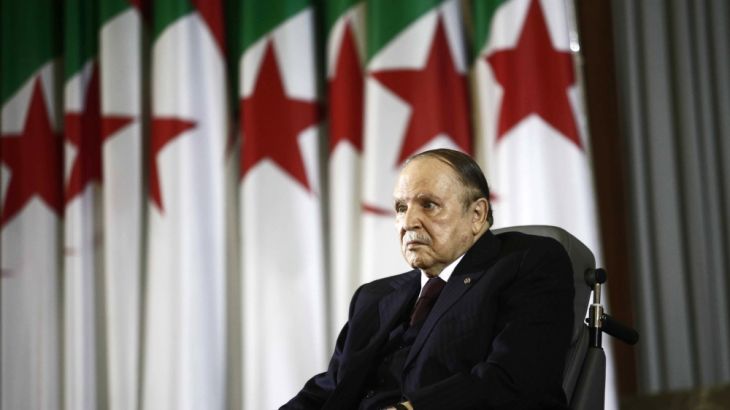Algeria’s Bouteflika will resign by April 28: State media
Millions of Algerians have taken to the streets calling for the 82-year-old to step down after about 20 years in office.

Algeria‘s President Abdelaziz Bouteflika will resign before his fourth term expires on April 28, his office has said in a statement carried by the official APS news agency.
The president will take “steps to ensure state institutions continue to function during the transition period,” said the statement issued on Monday, adding, his “resignation would occur before April 28, 2019.”
Keep reading
list of 4 itemsLithuania’s Nauseda wins first round of presidential election
Lithuania holds presidential election amid concerns over Russia-Ukraine war
Spain’s Socialists hail ‘new era’ in Catalonia following election win
Millions of Algerians have been holding weekly protests nationwide calling for the 82-year-old to step down after almost 20 years in office. He has rarely been seen in public since he suffered a stroke in 2013.
He had initially declared his candidacy for a fifth term, but on March 11 withdrew and postponed the election – originally slated for April 18 – in response to the massive protests.
Despite Bouteflika’s resignation, Algerian students on social networks called for large protests to be held on Tuesday in the capital and the rest of the country.
Mohamed, a member of a student union in Algiers, said that the departure of Bouteflika is not “enough”.
“It does not change anything. He will leave but the same regime, which has ruled Algeria since 1962 and its independence, will stay if we don’t continue to protest. What we want is not only Abdelaziz Bouteflika to step down, but we also want the creation of a new political system,” he told Al Jazeera.
Likewise, Amel, a computer engineer who lives in Algiers, said that she is not satisfied with Bouteflika’s decision. “He is only the tip of the iceberg. The ruling elite, who is clinging to power, is trying to distract us with the President’s resignation. But we are not duped,” Amel told Al Jazeera.
|
|
Amina, an undergraduate student at Algiers School of Architecture, who said that she would take part to a gathering against the government tomorrow, described Bouteflika’s last announcement as “a small victory”.
“It is a first step but this is not our final goal. We won’t be successful if Bouteflika resigns while the old guard remains after April 28. They must all leave. Now more than ever, we need to stay united and peacefully demonstrate against the regime,” Amina told Al Jazeera.
The move comes after Algeria’s powerful army chief proposed launching a constitutional procedure to have Bouteflika declared unfit for office. That proposal prompted tensions between the army and the president’s inner circle.
The Constitutional Council had been meeting to consider whether he can be removed from office because he is unfit to assume his duties.
Under article 102 of the constitution, the council can make such a determination and, pending parliamentary approval, proceed to declare the presidency vacant.
The Algerian constitution calls for the head of the upper house of parliament to act as interim leader for a maximum of 90 days while an election is organised.
Algerian national television announced on Sunday night that Bouteflika and Prime Minister Noureddine Bedoui had named a new government after weeks of mass protests and political tensions in this gas-rich North African country.
The new government must stay in place during the transition period.
Protests likely to continue
Al Jazeera’s Imran Khan, reporting from Tunis, said that although Bouteflika’s resignation was one of the demonstrators’ demands, the protest movement will continue as Algerians view the entire establishment as being part of the problem.
“[The problem includes] people who are seen as being close to him. That includes opposition in government and the army as well,” Khan said.
|
|
“The government will be hoping that this might have some sort of an impact, [but] everything suggests that it won’t have any impact on Algeria’s protests.”
The protests have been driven mostly by young Algerians, who make up a growing part of the population.
Demonstrators say Bouteflika and his generation are out of touch with the problems of the people.
Many Algerian youths struggle to find jobs, and desperation has driven some to attempt to migrate to Europe on rickety boats.
During Bouteflika’s 20 years in office, age and illness took its toll on the once-charismatic figure. Corruption scandals related to infrastructure and hydrocarbon projects have also dogged him for years and tarnished many of his closest associates.
Algeria is Africa’s biggest country by land mass and a major natural gas producer, but its energy riches have not trickled down to reach the pockets of its people.
Additional reporting by Djamila Ould Khettab in Algiers.